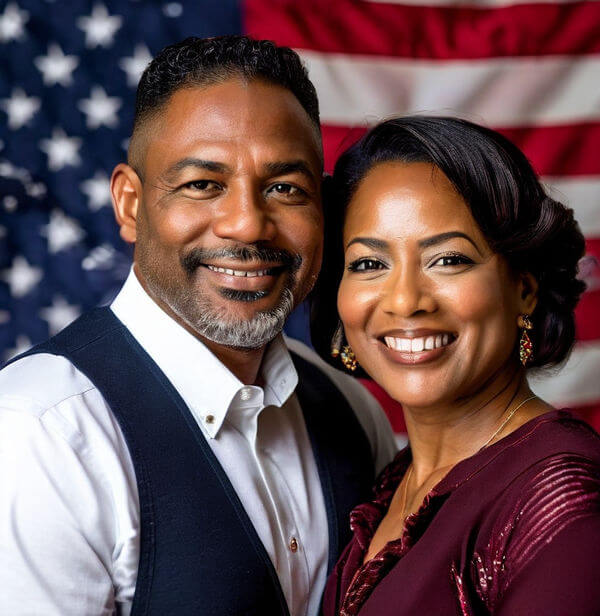
Congratulations on securing your marriage-based green card! This milestone paves the way for the next big step: applying for U.S. citizenship through naturalization. As a U.S. citizen, you'll enjoy the right to vote in all elections, the freedom to reside and travel outside the U.S. indefinitely, eligibility for federal employment, and permanent protection against deportation.
With a U.S. spouse, you are eligible to apply for citizenship after just three years, compared to the usual five. This expedited process offers significant advantages but requires meticulous preparation to ensure you gather all necessary documentation and accurately complete the required forms. Initiating this process early can greatly simplify your path to citizenship.
Why Pursue U.S. Citizenship?
Many green card holders aim to become U.S. citizens, a status that not only deepens their ties to the United States but also offers substantial benefits unavailable to them as permanent residents. Here are some key advantages of obtaining U.S. citizenship:
- Immunity from deportation: As a U.S. citizen, the United States becomes your permanent home. This means that even if legal issues arise, your right to remain in the country is secure. However, it's important to note that the U.S. government has pursued actions to revoke citizenship in cases of terrorism or fraudulent acquisition of citizenship.
- Access to a powerful passport: U.S. citizens enjoy visa-free or visa-on-arrival access to over 180 countries, making international travel easier and more accessible.
- Eligibility for federal benefits: Various federal benefits, including college assistance programs, are exclusive to U.S. citizens.
- Citizenship for your children: Any children you have automatically receive U.S. citizenship, even if they are born abroad.
- Government employment and political participation: Citizenship allows you to apply for federal jobs, vote in elections, and run for elected office (with the exception of President or Vice President).
These benefits underline the practical and profound implications of becoming a U.S. citizen, providing not just security but also broader opportunities both domestically and abroad.
Eligibility for U.S. Citizenship
All green card holders are eligible to apply for U.S. citizenship, but they must first satisfy certain conditions. Typically, you can apply after five years of continuous residency in the United States, known as the "five-year rule." However, if you are married to a U.S. citizen and obtained your green card through marriage, you qualify under the "three-year rule," which allows you to apply after just three years.
For those applying under the three-year rule, a crucial requirement is that you must have been living in marital union with your U.S. spouse for at least three years prior to filing for naturalization. Additionally, you must remain married up until you become a naturalized citizen, although the requirement to live in marital union only applies up until the time you file your application.
If you find yourself divorcing before reaching the three-year mark, you'll lose eligibility under the three-year rule and will need to wait until you've met the five-year residency requirement. Despite this, the five-year rule offers a consistent route to citizenship should your marriage dissolve.
Additional Requirements for U.S. Citizenship
When applying for U.S. citizenship, there are several crucial requirements to consider. First, ensure that you have filed federal tax returns for the last three or five years, depending on whether you are applying under the three-year rule as a spouse of a U.S. citizen or the standard five-year rule. These tax returns are essential, as your application won't be processed without them.
Another critical rule is to never register to vote or falsely claim U.S. citizenship on any forms before you are officially naturalized. Such actions are taken very seriously by USCIS and can lead to severe delays, denials, or even deportation proceedings. The initial questions on the naturalization form specifically ask about voting history; if you have registered to vote, seeking legal advice before proceeding with your application is advisable.
Male applicants between the ages of 18 and 26 must also register for the Selective Service and provide proof of this registration when applying for citizenship. The Selective Service is a registry used by the U.S. government in case a draft is reinstated. If you obtained your green card after turning 26, you are exempt from this requirement.
Lastly, maintaining a clean legal record is vital. While green card holders enjoy permanent residency, committing certain crimes can lead to deportation. The citizenship application includes questions about your criminal history; answering these honestly and providing necessary documentation is imperative. Being well-prepared and having all required documents at hand simplifies the naturalization process, ensuring you meet all legal requirements smoothly.
Steps to Acquire U.S. Citizenship
If you’ve confirmed your eligibility, gathered your tax returns, and are considering U.S. citizenship, here’s how to proceed.
- Begin by completing and submitting Form N-400, the “Application for Naturalization,” along with the necessary supplementary documents. This process requires a fee of $845, which includes $760 for the application and $85 for biometrics services.
- Next, you’ll attend a biometrics appointment, where your fingerprints, photo, and signature will be collected.
- Following the biometrics, you'll receive a notification detailing the date, time, and location of your citizenship interview. During the interview, you'll be sworn in and required to pass English and civics tests, unless you're exempt. Preparation materials and practice tests are available online to help you prepare. The interview also involves a thorough review of your application and assessment of your eligibility for citizenship. If you're applying under the three-year rule for spouses, additional questions may focus on the authenticity of your marriage and your living arrangement. Typically, you’ll learn whether your application was approved at the interview's conclusion.
- The final step is the Oath of Allegiance. While some locations may administer the oath on the same day as your interview, it's more common to schedule a separate appointment at a USCIS field office.
- After taking the oath, you'll receive your naturalization certificate, enabling you to apply for a U.S. passport and register to vote. Congratulations on reaching this significant milestone!

